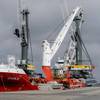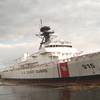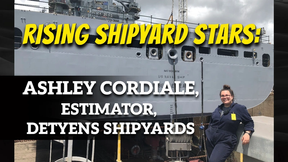Top Navy Officer Says Sub Captain is to Blame for Crash
"This is the meat of the matter," Konetzni testified, adding that sub commanders "have an unbelievable obligation to make sure there's nobody in the area".
"You'd better get as much pole out there as you can - periscope time - to make sure. That's what caused this collision, besides the fact that the moon and the stars and a few other things weren't going right because there's no way in a million years you could replicate this," Konetzni said.
A Navy statement said an initial study showed it could cost $40 million and take six months to salvage the sunken ship, the Ehime Maru, as the families of the victims want the United States to do. The statement said raising the trawler - believed to be the tomb of the nine missing crew members - from a depth of 2,000 feet would be "a complex and precedent-setting operation."
"The engineering portion of the study has identified a potentially feasible salvage option. However, the option requires a two-phase lift that would bring the vessel into shallow water and therefore requires an environmental review with federal and state officials," the Navy said.
At the inquiry, Konetzni prefaced his criticism of Waddle by saying: "I love this guy; I tell you he's one of my best friends." However, he said Waddle's decision to twice take command from the officer of the deck, Lt. Michael Coen, at critical times during an "emergency blow" maneuver shortened the time needed to process data, disrupted teamwork and likely precluded any of the crew from questioning his actions.
"If you're going to take it all on, you'd better make sure you know the facts and what you're doing because you're standing alone that way," Konetzni said. "I know he's not a criminal. I know he served for 19 years and I know he comes from good stock," he added. "We're not hot dogs out here. He's not the kind of person who is cavalier with his ship. But for an eight-minute period he took charge of that ship and acted like he knew everything and ... the young guys (on his crew) followed him for disastrous results."
The court of inquiry, which loosely resembles a civilian trial, will determine what action, if any, is to be taken against Waddle, Coen and Lt. Cmdr Gerald Pfeifer. Waddle and Coen have asked for immunity against prosecution before testifying.
Konetzni defended the "distinguished visitor" program that allowed 16 civilians on the Greeneville, three at the sub's controls, when it slammed into the Ehime Maru. He said civilian rides are "critically important" to teaching Americans about the navy, and that thousands have been done without incident.
"These are not joy rides and I resent the hell out of them being called that," Konetzni said. "We do not let them occur unless it is a part of something originally scheduled."
Vice Adm. John Nathman, one of three officers conducting the inquiry, asked if perhaps Waddle had been showing off for the visitors with the emergency blow.
"I think that he was excited about taking these people on board. They were from Texas" as is Waddle, Konetzni said. "But you don't need to do an emergency blow. We specifically don't tell our skippers what to do so we don't get into any situations. If he was (feeling) crowded and rushed, don't do an emergency blow. Who cares?" Konetzni said he could not understand why Waddle failed to take more time and ask for more information about sonar contacts before ordering the sub to ascend to shallow depths to proceed with periscope observations. He said he could see no reason Waddle should have felt rushed. "Going to periscope depth is not a routine operation," Konetzni said. "It's not routine and it's one we take very, very, very seriously. It's a team endeavor. And when the team doesn't work right, bad things happen. Time allows integration of the team effort." - (Reuters)












